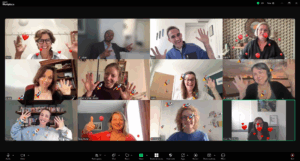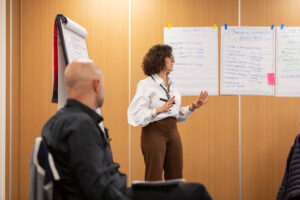What is Relationship Systems Intelligence?
It’s not about me. It’s not about me and you. It’s about us.
A relationship system is any group of people that shares a common identify or purpose. So could mean partners, families, groups or teams. Developing Relationship Systems Intelligence (or RSI) starts with understanding ourself, or Emotional Intelligence. It moves on to include understanding another’s emotional experience, or Social Intelligence. It culminates in our ability to both identify and collaborate with the whole system. Relationship Systems Intelligence is, if you like, the final evolution. Developing all three forms of intelligence creates flexible and resilient individuals and teams.
RSI catalyses the capacity of a group or team to move beyond the personal, to a powerfully generative group identity. People with high RSI are not threatened by differences, instead they seek out multiple inputs from the system. Teams with higher RSI are more productive and report greater team cohesion and satisfaction.
Signs your Relationship Systems Intelligence is low
Some of the ways that a lack of RSI can show up for individuals, teams and organisations include:
- Poor or toxic communication patterns
- Ineffective or confusing communication
- Unproductive or low team morale, or low positivity
- Conflict avoidance or poor conflict resolution
- Low creativity, productivity or team synergy
- Role confusion or poorly occupied roles
Fortunately, research indicates that Relationship Intelligence can be learned.
Key components of Relationship Systems Intelligence
→ Able to see past a group of individuals, to see the system itself as a living, breathing Third Entity.
→ Conflict not considered a problem but a sign that change is needed in the system. Conflict is handled skillfully. Less, ‘Who’s doing what to whom?‘ and more, ‘What’s trying to happen here?‘
→ Able to read the system and identify the emotional climate in a given situation.
→ Can practice Deep Democracy: all voices in the system, including the unpopular ones, get recognised as carriers of information and wisdom.
→ Able to shift from a personal perspective (“That’s Jane’s opinion.”) to a systems perspective (”Jane is expressing something that lives in the system. It’s not personal.”)
How to build your Relationship Systems Intelligence
Building RSI doesn’t have to be difficult. But it does require practice and a willingness to truly hold the perspective of the system, team or group. Awareness goes a long way to creating a shift. Here’s some things you could try:
Teams with higher RSI are more productive and report greater team cohesion and satisfaction.
1. Deep Democracy. Try to ensure all the voices in the system are heard and honoured, even unpopular ones.
2. Appreciative Inquiry. Try to value the best of ‘what is’, then envision what might be and dialogue what ‘should be’.
3. Increase team positivity. Aim for a 5:1 ratio of positive to negative interactions.
4. Decrease your negative interactions. Try consciously softer approaches to difficult conversations.
5. Increase positivity during conflict. Try to hold a lighter field, even during serious or difficult conversations.
6. Avoid toxic communication styles. Try to drop blaming, defensiveness, stonewalling, contempt or controlling.
We can help your team improve its RSI. Get in touch to find out how. We’d love to hear from you.






